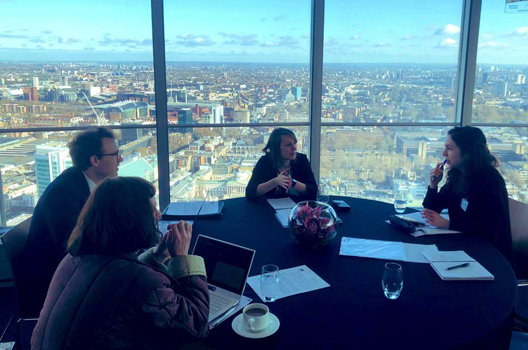The Cyber 9/12 Strategy Challenge—the brainchild of the Atlantic Council’s Cyber Statecraft Initiative—got underway in London on February 11. The two-day event is a unique and innovative cyber crisis and policy response simulation. The UK edition is part of a wider Atlantic Council effort to foster the next generation of multidisciplinary cyber professionals.
“The UK government’s National Cyber Security Strategy is clear that more must be done for the UK to meet the future national demand. Much like the NCSC’s CyberFirst courses, Cyber 9/12 is an effective way to nurture the next generation of cyber security experts,” said Paul Chichester, director for operations at the National Cyber Security Centre in London.
This year, the competition is hosted by the Atlantic Council’s partner, BT, at BT Tower in London.
Now entering its seventh year globally, the Cyber 9/12 Strategy Challenge has been held in the United States, France, Switzerland, and Australia. Competitors respond and react to an evolving crisis scenario, and use their knowledge of law, technology, and policy, as well as domestic and international affairs, to propose courses of action to respond to the crisis and mitigate the threat.
Pete Cooper, a senior fellow at the Cyber Statecraft Initiative and independent cyber security adviser, is spearheading the UK competition. Cooper’s extensive background in strategy includes more than twenty-four years in the UK’s Royal Air Force, including time serving as strategic cyber operations adviser to the Ministry of Defence.
The competitors are a diverse group—the next generation of cyber policy and strategy leaders that can analyze, distil, and translate complex cyber security challenges in effective teams across multiple disciplines. Half of the participants are women.
Participants are competing for the grand prize sponsored by Rapid7: a trip to Las Vegas in August to attend Black Hat USA 2019, a cybersecurity conference. This unique experiential prize will expose students to a wide range of cybersecurity issues and diverse careers in the field.
In addition to the main event, competitors will have the opportunity to listen to keynote speeches, including by Ruth Davis, head of commercial strategy and public policy at BT Security.
On the second day of the competition, teams that did not get through to the semi-final will attend a coaching masterclass on cyber strategy run by Danny Steed of ReSolve Cyber and other industry leaders. Teams will benefit from time in small breakout groups with these mentors who will take them through key areas where they can work on their cyber strategy skills.
Coaches, judges, and speakers will attend a high-level dinner at Lancaster House, in the same room where Winston Churchill hosted a coronation banquet for the newly crowned Queen Elizabeth II, on February 11. The dinner, sponsored by the British government and SecureAuth, will also be attended by senior figures from across the UK cyber security industry, academia, and government who will discuss the current cyber landscape and the skills needed to tackle current and future challenges.
Against the backdrop of the 70th anniversary of the founding of NATO, former NATO Secretary General George Robertson and Cooper will lead a session exploring the current challenges facing the international community and NATO and what this means for building the workforce to tackle these challenges.
All participants will attend the final round of the competition at the culmination of day two, where the final three teams will present to a panel of senior judges, including Lord Harris of Haringey, Rob Partridge of BT, and senior government and industry figures.
The impact, reach, and engagement that the UK Cyber 9/12 challenge has this year is a huge indicator of its value and of the diverse skills it promotes. Support from BT as the strategic partner; SecureAuth as the VIP dinner partner; NATO, Dell EMC, Rapid7, Standard Chartered, KekstCNC, Resolve Cyber, YardPartners, the Cyber Defence Alliance, the Global Cyber Alliance, TechUK, and RUSI is a clear sign of the impact the competition is starting to have.
Jack Watson is a project assistant in the Cyber Security Initiative at the Atlantic Council’s Scowcroft Center for Strategy and Security.
Image: Participants in Cyber 9/12 Strategy Challenge respond to an evolving crisis scenario on the first day of the competition at BT Tower in London on February 11. The competition is the brainchild of the Atlantic Council’s Cyber Statecraft Initiative.
